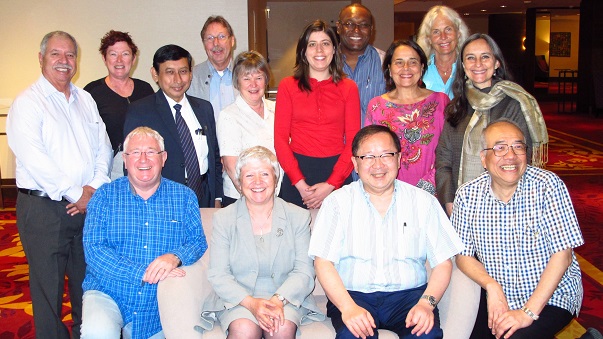From the President : the final column
 Amanda Howe and WONCA Executive 2016-2018
Español Français
Amanda Howe and WONCA Executive 2016-2018
Español Français
This will be my last news as President, which feels very strange! I would like to thank all our members for their support for family medicine, and for WONCA.
Soon we shall host our World Council and World conference in Seoul in South Korea, where we shall have much business to discuss. Thanks to the efforts of the Secretariat and the current Treasurer (Prof Job Metsemakers), our accounts are healthy, and we can plan with more confidence for the next biennium. We are very pleased that one of our lead contacts at WHO, Dr Shannon Barkley, will join us for part of Council, which will help us to focus on this key relationship and the ways we can most effectively work together. In fact, much of September’s WONCA business was generated by WHO as they consulted with us and other stakeholders in preparation for the 40th Anniversary of the Alma Ata Declaration: more thoughts on this work and its implications are in my September policy bite. We shall report later on the WHO meeting, in October, in Astana, where five of us will represent WONCA at this important summit to mark the anniversary, and launch a new Declaration.
Recent visits
I was delighted to undertake two overseas visits in the last period - to Indonesia, where I met leaders of the Indonesian College of Primary Care Physicians (our member organisation), gave a keynote at their seminar, and saw the graduation of some of their recent cohort of new family doctors. Their situation is challenging, as family medicine is not yet legally recognised as a speciality, and there is only one training scheme at present – which for a country of more than 260 million people is not much! But colleagues are fighting hard to change this, have the support of their health ministry, and are hoping for change soon.
I also spoke at a conference on rural health workforce, hosted by one of the universities, and was able to draw on the excellent work of our own WONCA Working Party on Rural Practice for much of the evidence I presented in my keynote. Indonesia faces huge challenges to supply its rural population with health care as it is spread over more than 17,000 islands; but it is making strong efforts to achieve UHC for the rural population – helped by the Indonesian Rural and Remote Doctors association (IRRDA). I met many passionate and committed staff from primary care, and congratulate them all.
By the time this news is published, I shall also have attended the World Psychiatric Association meeting in Mexico, where I am giving a keynote on ‘Making mental health work in primary care’. Again, I am grateful to be able to draw on and promote the excellent work of our WONCA Working Party on Mental Health – it is a real strength of WONCA that we can bring expertise from all parts of the world into our policies and presentations, and it certainly enhances our reputation with other specialities. Psychiatry is a speciality which also faces many challenges, and it will be good to share our learning and expertise, as mental health is such an important part of both our jobs.
Reflections
I shall close this column with a few reflections on what I have learned in this two years as President.
I think we must never assume that our speciality is safe – as we have attrition from other specialists, from markets that can draw our workforce overseas or out of service, and also some ‘competition’ from other health professionals. While professional choice is important, and the skills of others are fully recognised and valued, many countries continue to not train enough family doctors for the needs of their people; fail to offer them equitable terms and conditions; and also may not support their career structures.
Some regions, such as Iberoamerica, have family medicine embedded in most countries’ health systems, while other regions, such as Africa, have very few countries with such acknowledgement of our speciality. Even in a country like the UK, the choice to become a family doctor has become less popular because of excessive workload and unstable working conditions. So our efforts must continue to develop our discipline’s profile and expertise, get recognition for its importance and status; and to inspire and train others to join us.
I have been constantly impressed and encouraged by the wonderful family doctors I have met on my Presidential visits, so I know we have many working for the same cause. And as past President, just like my esteemed predecessors, I shall continue to support WONCA and its mission. Thank you.
Amanda Howe
President